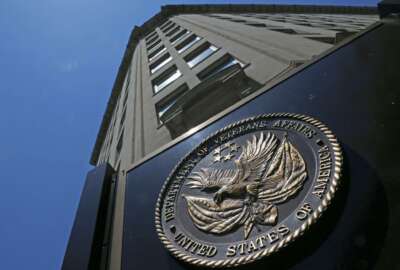VA Home Loan Program expands to help vets facing pandemic foreclosure
The VA Home Loan program announced it would expand services to help homeowners facing foreclosure due to the pandemic, and also to help those looking to buy as ...
Best listening experience is on Chrome, Firefox or Safari. Subscribe to Federal Drive’s daily audio interviews on Apple Podcasts or PodcastOne.
At the Department of Veterans Affairs, one of its older, more successful programs is getting an update, due to the pandemic creating new stresses on those who use it. The VA Home Loan program announced it would expand services to help homeowners facing foreclosure due to the pandemic, and also to help those looking to buy as many areas are facing a limited housing stock. To learn more about this effort, Federal Drive with Tom Temin spoke with Jeffrey London, executive director of the Loan Guarantee Service at the VA.
Eric White: At the Veterans Affairs Department, one of its older, more successful programs is getting an update due to the pandemic creating new stresses on those who use it. The VA home loan program is announcing an expansion of its services to help homeowners who are facing foreclosure due to the pandemic, and also to help those who are looking to buy as many areas are facing a limited housing stock. To learn more about this effort, I spoke with Jeffrey London, who is the executive director of the Loan Guarantee Service at the Veterans Affairs Department.
Jeffrey London: So the VA home loan program has actually been around since the original GI bill in 1944. So 77 years, and still going strong. And one of the hallmarks of the VA home loan program is the no down payment option. It has been available since 1944. The also great news is that the VA has the lowest interest rates in the entire mortgage industry. So if a veteran or service member is eligible for this program, this is the best deal, bar none. There’s no private mortgage insurance, which can be $200 or $300 extra per month that has really no benefit to the veteran. And also we have low closing costs. And the great news is it’s a lifelong benefit that can be used over and over again to either purchase homes or refinance an existing VA loan.
Eric White: And so I understand that, as everyone else is facing some economic turmoil right now, there is an update that you all are doing to this program. How did that come about? And what exactly is it?
Jeffrey London: Yeah, so as a result of the pandemic, as you know, many people unfortunately, were impacted whether or not they lost their job, or they had a cut income. So one of the things that Congress did is they passed what’s called the Cares Act last year, that allowed borrowers who were facing financial difficulties as a result of the pandemic to enter in what’s called a loan forbearance, meaning that they would not have to make their mortgage payments for up to 360 days, if in fact they were impacted. So what the VA did was looking at their program, we knew that veterans were going to be able to get back on their feet. And so we wanted to lessen the financial burden of having to pay back those missed payments. So VA established a program where on behalf of the veteran VA will actually pay those missed payments back to the mortgage company at 0% interest. And that will become a second loan established to the property and the veteran would not have to pay the VA back until they either sold the home or refinanced that loan. So it’s a great deal to help veterans get back on their feet.
Eric White: Have you had a chance to talk to any of the benefactors themselves? And if so, what have you been hearing from them about this update?
Jeffrey London: Well, the good news is this definitely has taken as I said, some of the financial burden that those veterans and their families may be facing. But the great news is we even have an additional program because that particular program that I’ve referenced, that’s for a veteran that can continue with the same mortgage payment that they had prior to the loan forbearance. There’s some veterans, unfortunately, who can no longer afford their current mortgage payment. So in listening to veterans and stakeholders in the mortgage industry, we actually have a another program where we can help veterans who need to lower their monthly mortgage payment, in addition to paying back those missed payments. So now on behalf of the veteran, VA will actually pay down the principal balance of the loan at 0% interest to help that veteran have a more affordable payment. So we’re looking for at least a 20% reduction in their monthly payment to help them navigate those troubled waters that they may be having.
Eric White: Getting a little more background on on home loan guarantees for veterans. What is it particularly about veterans that makes them a little more susceptible whenever there are economic events or that occur like this? Whether it’s the 2008 housing crisis, or what we’re going through right now,
Jeffrey London: The great news is I think our veterans and service members are extremely resilient. And I think that is a testament to the service that they’ve given to our nation. So you mentioned the mortgage crisis of 2008. Actually, VA loans performed better than any other mortgage loan in the entire industry because veterans, they are good deal because it’s never a good deal to bet against our nation’s veterans. And so they’re able to navigate in difficulties even better than some, but for those veterans who need the assistance, VA has always been there. And since 2008, we’ve helped over 900,000 veterans avoid foreclosure when they were in financial difficulties.
Eric White: We’re speaking with Jeffrey London. He’s the executive director of the Loan Guarantee Service at the Veterans Affairs Department. Can you tell me a little bit about the financial stability of the VA home loan program itself? How is it going along and is it sustainable at this point?
Jeffrey London: Actually it is sustainable. VA has the lowest foreclosure inventory rate in the entire mortgage industry, we have the second lowest serious delinquency rate, and that’s for loans that are 90 days or more past due. The only loans that are performing better than VA are those prime pristine loans where borrowers have the best credit and they have assets in the bank. So veterans are actually outperforming their counterparts and the VA home loan program is actually extremely sustainable, where we’re actually operating and not losing any money from a government perspective, because veterans, again, are a good bet.
Eric White: Give me a little bit more of the history. This is one of the oldest programs that is still being used so actively today. What does it look like today as compared to when it was first implemented?
Jeffrey London: Sure. What’s interesting is since 1944, VA has guaranteed over 27 million loans for our nation’s veterans and servicemembers. And that’s totally over $3 trillion. So you could just think about the impact that that has not only for the veterans and their families, but helping to build communities around the country. And just last year, we experienced a record year where we guaranteed 1.2 million loans for $375 billion. That is more than double the previous record that we had in 2017. And this year alone, we’ve already surpassed last year’s record where we’ve guaranteed 1.3 million loans, and we still have a little over a month left, and we’re in the height of the home buying season. And we’re on pace to have a record year for veterans using the benefit to purchase loan. So it’s an extremely popular program and it’s getting more and more popular because the secret is out. This is the best deal for veterans and service members, bar none.
Eric White: So it’s created in 1944. After World War Two, obviously, there’s a big spike in the amount of young men looking to buy homes. As of now, do you still see those same spikes? Obviously, completely different situations? But things winding down in Afghanistan, in Iraq? Do those events also affect and do you see spikes in when people are returning home from deployments? Or is it just kind of an apples to oranges sort of thing?
Jeffrey London: Well, one of the interesting things about this particular benefit is you don’t have to be a “veteran” to be eligible for this program. If you’re serving in uniform today, after 90 days of active service, you are actually eligible for this program. So we see a lot of service members who are maybe on their second or third tour and they’re starting a family and they want to establish roots for their family. They’re actually utilizing this program while they’re still serving in uniform. And as you mentioned, there certainly are folks who are transitioning from service each and every year, they’re about 250,000 service members who transition out of the military. And so this benefit is there waiting for them. But the great news is, this is a lifelong benefit. So some transitioning service members may want to focus on their education and utilize their GI Bill education benefits. But when they’re ready to purchase a home, the VA home loan program is there for them.
Eric White: Yeah, gotcha. Gotcha. Anything else that we haven’t touched on that you want to make sure that people know about?
Jeffrey London: Yeah, one of the things I want to touch on – thank you for that question, Eric – is there are a lot of myths about the VA home loan program. This is not your father’s VA, the VA home loan program has spent significant resources in modernizing the program. VA loans close as fast as other loan products. And as I mentioned earlier, there’s a testament to that and what the cost is for veterans. VA actually has the lowest interest rates in the entire mortgage industry. So don’t believe the myths that are out there. Please look into the program if you’re eligible, because as you rack and stack it against other loan products, it’s the best deal bar none. So don’t let anyone talk you out of your earned benefits if you’re eligible for this program.
Copyright © 2024 Federal News Network. All rights reserved. This website is not intended for users located within the European Economic Area.
Tom Temin is host of the Federal Drive and has been providing insight on federal technology and management issues for more than 30 years.
Follow @tteminWFED





